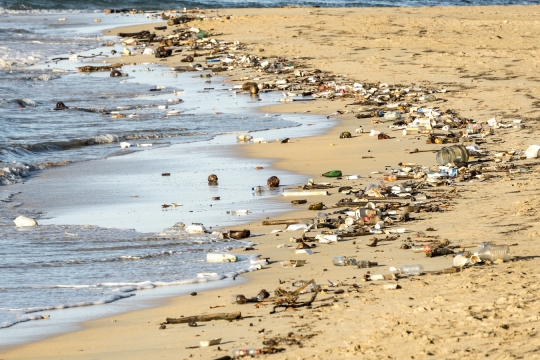The question of how to address plastic pollution in the world’s oceans is very similar to that of carbon emissions in the atmosphere: it may be possible to tackle the source of the pollution within the borders of specific countries, but the impacts of this accumulated waste fall outside of the responsibility of any individual nation state. How, then, do countries decide who is responsible for clean-up operations, and how to do it?
Tackling this escalating environmental crisis might call for an international convention similar to the ongoing efforts to address global warming through the United Nations Framework Convention on Climate Change, the UNFCCC.
Members of the Environment for Development (EfD) initiative are about to gather in Gothenburg, Sweden, to consider the network’s role in how to assist developing world governments to influence international discussions on how to address ocean-plastic pollution.
EfD is a network of developing world economists that aims to support government policy relating to sustainable developing through providing evidence-based economic research.
Ocean plastic pollution has come into focus more urgently in recent years, particularly with the World Economic Forum and the Worldwide Fund for Nature (WWF) highlighting the need to slow the release of this form of pollution into the ocean environment, as well as find effective and sustainable ways to clean up the pollution already present in marine waters.
‘The EfD meeting in September is an opportunity to explore how we as academics can influence the global discussion,’ says economist Dr Reza Daniels, from the University of Cape Town’s School of Economics. Daniels is associated with the South African chapter of the EfD network, the Environmental Policy Research Unit (EPRU), and will attend the workshop to help shape the discussion.
‘This is a chance for EfD to draw up a coherent policy on ocean plastics waste,’ he says. ‘Until now, EfD hasn’t done work in this field, and it’s an important opportunity to build upon.’
It is too early to say what possible ocean-plastic interventions will be up for consideration for future research through the EfD collaboration, although it's likely that the research focus will steer towards initiatives that can reduce the flow of waste into the environment, rather than on waste clean-up operations, Daniels says.
In terms of EPRU’s likely contribution towards the EfD network research agenda on ocean plastics, this could take the form of studying how ‘behavioural nudges’ targeting individuals and households could be used to reduce single-use plastic waste. EPRU behavioural economists have used behavioural nudges to test how effective this method can be to encourage voluntary reductions in water or energy use amongst consumers in Cape Town. ‘Nudging’ is a concept that tries to influence behaviour positively through small interventions, such as sending affirming messages to water users in their utility bills, showing how much they have reduced their water use compared with the neighbourhood average, for instance.
It is unlikely that EfD will investigate research options relating to pollution clean-up operations, though, according to Daniels. This is an area where the private sector is already testing various technological innovations. However, much of the outputs of private sector research and development is proprietary and usually closely guarded intellectual property.
‘As academics, we need to be able to publish our findings, which we can’t do if we're subject to private-sector IP issues.’
However Daniels argues that the scope for influencing society regarding plastics waste needs to reach beyond households through behaviour change interventions.
‘We need to look at viable initiatives that will target awareness raising not just in schools and homes, but also within government and business.’
One of the criticisms of targeting user-level behaviour change relating to plastics use, is that it shifts the responsibility for plastic pollution onto individuals at the bottom end of the value chain. This allows larger corporations at the top of the value chain to continue flooding the system with plastics. Interventions need to be geared up towards throttling back the volume of plastics entering the system in this way, which may call for strict policy intervention from governments.
‘The meeting in Sweden is an opportunity to see how we as a network of economists from the developing world can play a meaningful role in this global discussion.’
EPRU resource economist Dr Jane Turpie may assist in advising the process, and will likely consider the opportunity to study the economic impact of ocean plastics on fisheries.
The outcome of the meeting in Sweden will inform EfD and EPRU research relating to ocean plastic waste in 2019.
By Leonie Joubert
